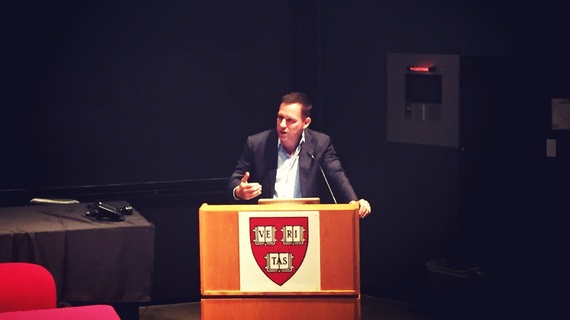One of our greatest concerns today is how technology will alter our lives in the decades to come. Part of the Science & Democracy lecture series at Harvard, Peter Thiel, co-founder of Paypal and Palantir, offered new ways to propel the masses forward during this revolution of information technology.
Thus far, despite technology's many positive benefits, the public tends to use and abuse its capabilities rather than improve on it. Thiel argued that from the "Christian Right to the Hollywood Left", we live in an anti-science age, and do not produce nearly enough groundbreaking technology. "If Einstein could write a letter to the White House, the letter would probably get lost in the mailroom," he joked. The fact remains that as other nations continue to globalize and push toward this societally enhancing frontier, the U.S. and the world falls short.
People's opinions are split between two drastic categories when it comes to technology: fear of its advancements, or lack of excitement for its future developments. The masses are easily swayed by films such as the Terminator, a dystopia in which machines first take our jobs and gradually become so intellectually advanced, they see no need for our existence. After watching Gravity, Thiel noted that he like many in the audience didn't feel even the slight bit excited about space exploration. Reality's problems and daily media already continue to batter us with the consequences of global warming or bioengineered weapons, yet little is done to resolve or even prevent further problems so that the rest of civilization can at least begin to develop a more optimistic sense of what our future has to offer.
There are still countries throughout the globe that continue to develop at a steady pace but innovation is required for such progress. "For globalization to work," Thiel argued, "we need more innovation." If countries such as China cannot maintain their growth due to a slack in technological achievements, the masses will force new regulations. In the developed world, the problem rests in the fact that people already consider their countries to be developed.
Thiel also stated it is much more difficult to learn something today than it used to be prior to our plethora of gadgets and applications. During the Enlightenment in the 18th century, limited knowledge was accessed and read by everyone. In the world of hyper specialization that we live in today, it is harder to measure progress and we often defer our judgment to experts who are biased in their narratives. Though we made progress in the world of bits over the last forty years, the world of atoms has stagnated, argues Thiel. Discussions on space travel and supersonic aviation are not part of the public discourse.
Thiel believes that if we had more technological progress our wages wouldn't have stagnated. In the world of macroeconomics, an environment of zero interest rates, which translates more into negative 2% in the real world, means that we have no idea how to better employ capital. When a company prefers to keep its cash on its balance sheet, it says that it doesn't have a better idea what to do with the money. What's more, the patterns of the recent financial bubbles suggest that people have a sense of a better future, but not a way on how to go about that.
Thiel offered responses to three common critiques. As liberals point out that we live in a financial world dominated by Wall Street to them education is the solution. But often in education the people we educate are not employable material for the future. Conservatives argue that innovation is pushed by military spending and due to that, then our future is built on sacrifices and engaging in wars. This is also not a good solution.
Libertarians blame the government and find regulations to be the source of problems. However, Thiel believes that the main complication is not enough growth. For example, if China fails to maintain high growth levels, the people will usher in a new wave of regulation. The future depends on individuals that don't treat nor think of themselves as lottery tickets that can be tossed aside when their ideas are not welcomed. The future must be thought of in concrete terms so that substance is emphasized over process.
Throughout this lecture, I noted that despite Thiel's arguments for the future, the panel was filled by faculty members from Harvard with no signs of anyone of a younger generation. A dialogue about the future, however, is a dialogue amongst all generations. This is true especially since Thiel's lecture was particularly potent to millenials.
Furthermore, our efforts must focus on how to make the world more sustainable. Facebook does not create its own content, and Alibaba doesn't have any inventory. Uber doesn't have cars, and Airbnb has no beds. Everyone rides the trend of a collaborative economy, as Robin Chase, co-founder of Zipcar, would say that we are all contributing to build as a singular force. Above all, as Thiel suggests we must look to the future with a definite sense of optimism.
Theodora Karamanlis contributed editing to this piece.

